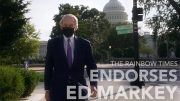By: Lisa Keen/Keen News Service—
May 14, 2009. Hollywood producer Rob Reiner and his wife Michele hosted a lunch to talk about a lawsuit they were supporting to challenge Proposition 8, California’s ban on same-sex marriage. At the table with them were public relations business partners Chad Griffin and Kristina Schake and openly gay Hollywood producer Bruce Cohen. Except that screenwriter Dustin Lance Black was absent, this was the entire board of the one-month-old American Foundation for Equal Rights (AFER).
Gibson, Dunn & Crutcher partner Ted Boutrous was there, representing his colleague, the well-known conservative attorney Ted Olson, who had been engaged to lead the litigation. But Boutrous was not just a stand-in. He was a crisis management strategist, veteran appeals court advocate, and an expert in media affairs. He would be one of the legal team’s top attorneys.
Their guests were two attorneys from the nation’s oldest national LGBT legal organization, Jon Davidson and Jenny Pizer, and two attorneys from the Southern California chapter of the ACLU, Ramona Ripston and Mark Rosenbaum. Davidson was national legal director for the 36-year-old Lambda, the group that helped win the Romer v. Evans case which many believe paved the way for later LGBT victories when the Supreme Court declared that laws disfavoring gay people cannot be justified by animus. Pizer represented Lambda as co-counsel on the in re Marriage Cases that won the May 2008 ruling from the California Supreme Court that allowed 18,000 same-sex couples to marry until voters changed the state constitution that November. Ripston was executive director of the southern chapter, an attorney whom the Los Angeles Time had recently named one of the “100 Most Powerful People in Southern California.” Rosenbaum, too, had racked up considerable kudos since joining the chapter staff in 1974. [pullquote]Davidson was national legal director for the 36-year-old Lambda, the group that helped win the Romer v. Evans case which many believe paved the way for later LGBT victories when the Supreme Court declared that laws disfavoring gay people cannot be justified by animus. [/pullquote]
According to Jo Becker’s Forcing the Spring, Rob Reiner started things off by giving the guests a synopsis of the AFER group’s discussions and then Boutrous said that Ted Olson had been engaged to lead the lawsuit.
“Someone is going to bring a federal marriage lawsuit,” Boutrous said, according to Forcing the Spring. “And you won’t find a better advocate than Ted Olson.”
Given Olson’s well-known conservative ties and activities, it was a bold statement. And Becker’s account states that the Lambda and ACLU attorneys interrupted Boutrous with a “cacophony of criticism that grew increasingly heated.” She said they complained that Olson wasn’t “one of them.” They characterized Griffin and his pals as “upstarts who didn’t know what they were doing.” And they echoed a point respected gay legal activist Paul Smith had already made directly to Olson: that if a lawsuit were brought too soon, it could set the LGBT civil rights movement back for decades.
Tempers flared and, according to Becker’s book, Lambda’s Davidson “threw a multi-page dossier on the dining room table, outlining all the conservative causes Olson had championed over the years. This, and more, would be released to the media if they went ahead with their ill-fated plan, he threatened.” [pullquote]Given Olson’s well-known conservative ties and activities, it was a bold statement. And Becker’s account states that the Lambda and ACLU attorneys interrupted Boutrous with a “cacophony of criticism that grew increasingly heated.” She said they complained that Olson wasn’t “one of them.”[/pullquote]
“Do it,” shot back Griffin’s public relations partner, Kristina Schake. Griffin tried to explain how having a conservative attorney would “move public opinion.” But the meeting, wrote Becker, “abruptly ended on that angry note.” And Michele Reiner pronounced the meeting a “disaster.”
Davidson says he doesn’t remember the meeting being the angry drama Becker paints. Neither does his Lambda colleague Pizer.
“We did not treat those present at the meeting who were affiliated with AFER as ‘upstarts,’” nor did it “end abruptly” or on any “angry note,” said Davidson. And the idea that Davidson would throw a dossier down on the table and make threats, he said, is “inaccurate.”
“That is not who I am.”
Davidson recalled that, “after the meeting was concluded, the Reiners, Chad Griffin, Ted Boutrous, and Bruce Cohen walked with us outside as we headed back to our cars and we all shook hands and said pleasant goodbyes.”
“We left the meeting with an agreement to talk further,” said Davidson, “and there were additional conversations between us and some of those affiliated with AFER who were present at the meeting between then and the filing of the suit.” [pullquote]Davidson says he doesn’t remember the meeting being the angry drama Becker paints. Neither does his Lambda colleague Pizer. … Davidson recalled that, “after the meeting was concluded, the Reiners, Chad Griffin, Ted Boutrous, and Bruce Cohen walked with us outside as we headed back to our cars and we all shook hands and said pleasant goodbyes.”[/pullquote]
Pizer characterized the meeting as “very cordial and friendly.”
“They seemed disappointed that we weren’t enthusiastic about their plan,” said Pizer. “Chad did, too. And maybe a little frustrated that we expressed skepticism about the Supreme Court’s likely willingness in the very near term to strike down 30 newly enacted state constitutional marriage amendments with a gay version of Loving v. Virginia. But none of the interactions seemed angry or hostile.”
But the difference in strategy was significant. Lambda, the ACLU, and seven other major LGBT legal and political organizations released an “open letter” on May 27—five days after the AFER-Olson lawsuit was filed—warning against “premature lawsuits,” propelling the behind-the-scenes conflict—however large or small—into public view.
“There is a very significant chance that if we go to the Supreme Court and lose,” said the open letter, “the Court will say that discrimination against LGBT people is fairly easy to justify, and that same-sex couples can be denied the right to marry based on mistaken, antigay assertions that LGBT people make bad parents. Indeed, we have recently lost marriage cases on that very basis in the state high courts of New York, Maryland, and Washington, and in intermediate appellate courts in Arizona and Indiana. Such a ruling from the U.S. Supreme Court could hurt us badly in cases about parenting, schools, and government jobs.”
In an interview last week, Boutrous said he thinks the difference in strategies, even with the friction that went along with it, was a good thing. One strategy called for pushing hard for a court ruling to secure legal equality as quickly as possible; the other focused on building a “lasting, heartfelt understanding and recognition of the need for LGBT equality that is real and that endures in people’s hearts.”
“You need both,” said Boutrous. After the AFER-Olson team filed the lawsuit, he said, the LGBT groups were “extraordinarily helpful” and still are. [pullquote]“In addition, the public education surrounding the case was brilliant, and having Ted Olson leading the case was instrumental in helping pave the way for more conservatives to support marriage equality. To me, what’s most important to recognize, however, is that we all had the same long-term aims.” [/pullquote]
“The combined strategies,” he said, “ended up giving the overall [marriage equality] effort the best of all worlds.”
The Supreme Court struck down the Defense of Marriage Act (DOMA) in U.S. v. Windsor the same day that it agreed that Proposition 8 supporters lacked proper standing to appeal a federal district court ruling that found the ban unconstitutional. That was June 2013. Today, notes Boutrous, Lambda, the ACLU, Gay & Lesbian Advocates & Defenders, and the National Center for Lesbian Rights, and even Paul Smith (working with Lambda) are all working with the AFER-Olson team on the Fourth Circuit case that argued Tuesday in Virginia.
Davidson said he believes the LGBT groups’ assessment was correct in 2009—that it was “too early” to launch a marriage equality lawsuit toward the Supreme Court and “that the Supreme Court would be more receptive to a challenge to DOMA first.”
“But, as I’ve said before, I may not have appreciated at the time how, if AFER had not launched a suit challenging Prop. 8, someone else who had less able counsel, less funding, and less public relations expertise than they did likely would have filed a challenge, and very well might not have succeeded in overturning Prop. 8,” said Davidson. “In addition, the public education surrounding the case was brilliant, and having Ted Olson leading the case was instrumental in helping pave the way for more conservatives to support marriage equality. To me, what’s most important to recognize, however, is that we all had the same long-term aims.”
© 2014 Keen News Service. All rights reserved.








